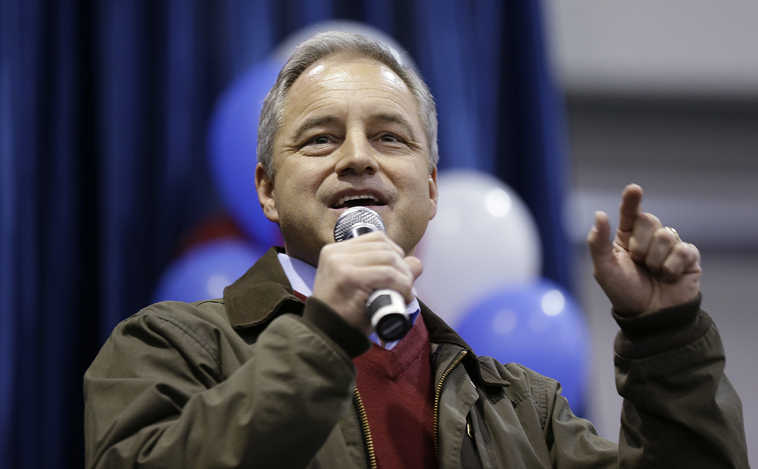JUNEAU — Over the last five years, Gov. Sean Parnell has left his mark on education, oil tax policy and efforts to advance a long-hoped-for natural gas pipeline project. He made the scourge of domestic violence and sexual assault in Alaska part of the public conversation through the “Choose Respect” initiative.
It is a legacy he is proud of, one he hopes endures after he leaves office Monday.
“I really had, and have, a vision of a brighter future for Alaska and articulated that as economic growth and economic opportunity and stronger, safer families,” he said.
In a recent interview, he recalled telling his staff that they have left the state better than they found it. His advice to the incoming governor, Bill Walker: “Continue the path of growing economic opportunity for Alaskans, continue the path of respect for all people in the state and take each day and each challenge and do your best.”
The 52-year-old left open a possible return to public office but said his immediate plans include spending time with his grandson, born about two weeks after the election.
Parnell said the results were too close to draw any clear messages from voters, but critics believe resentment from the rollback of oil production taxes and his handling of allegations of sexual assault and other misconduct within the Alaska National Guard contributed to his loss. Parnell ran with Anchorage Mayor Dan Sullivan.
Sen. Bill Wielechowski, D-Anchorage, also said state government lost some checks and balances when Republicans took charge of the Senate following the 2012 elections, putting the GOP in control of the Legislature and governor’s office. Walker is a Republican-turned-independent. His lieutenant governor, Byron Mallott, is a Democrat.
Parnell was serving as Sarah Palin’s lieutenant governor when Palin stepped down in 2009. He was seen as a calm, stabilizing force after the legislative fights that marred Palin’s final year in office following her failed 2008 vice presidential bid. He won the office in his own right in 2010.
As governor, he championed a state-sponsored scholarship program as a way to set higher expectations for high school students and help transform the education system. He supported hiring more village public safety officers, who serve as first responders in rural communities, though turnover remains high. He made record vetoes to budgets he considered bloated, jumpstarted efforts to advance a major gas line project and made fighting federal overreach a focus.
His administration unsuccessfully pushed legislation aimed at improving the state’s permitting system that critics said would have limited public participation. And despite efforts to limit spending, the state, which relies heavily on oil revenues to operate, faces budget deficits amid slumping revenues.
In 2013, after several failed attempts to overhaul the oil tax structure put in place by Palin, Parnell won passage of a tax cut he saw as a way to boost production and encourage new investment. In August, the industry-supported tax cut survived a repeal effort backed by Walker and Palin.
Palin, who endorsed Walker and Mallott as “strong conservatives,” said Parnell, a former ConocoPhillips employee, “came from the oil industry.” Critics saw Parnell as too sympathetic to the industry and blasted the tax cut as a giveaway. Parnell and others say the flurry of activity on the North Slope and billions of dollars in planned investment by companies shows the tax change is working.
Parnell said he was bothered by Palin’s comments but chalked them up to politics. He said the name-calling doesn’t describe him as a person or as a governor.
“Some people are really good at slinging slogans, and then there’s substance. And I know who I am,” he said. “I know that I’m a man who brought all of my heart and all of my strength and all of my soul into this work for Alaskans. I know who I represented and that’s Alaskans.”
The National Guard scandal cast a shadow over the election with Parnell criticized for not doing enough about allegations of misconduct. Media organizations sued for the release of records into the administration’s handling of the complaints that shed little new light on what Parnell has said publicly.
Parnell said he acted on every allegation brought to him, and in February, went to the National Guard Bureau after receiving concrete examples of how the command structure was failing.
The bureau’s findings — which sharply contrasted with an inspector general investigation requested by U.S. Sen. Lisa Murkowski — led to the ouster of adjutant general Thomas Katkus in September. Parnell said he hopes Walker follows the road map laid out by the bureau for restoring confidence in guard leadership.
Parnell said he and his wife, Sandy are grateful for the last five years.
“It’s been tremendous being able to serve in this position,” he said. “It’s been an honor of a lifetime.”

